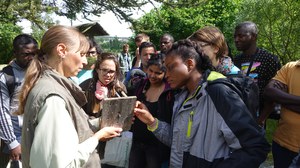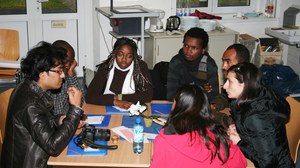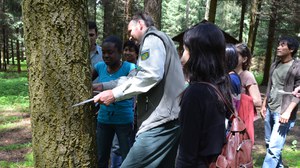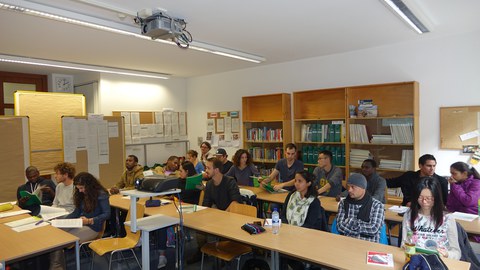Teaching at the Chair of Tropical and International Forestry
Lectures are hold for bachelor and master courses in Forest Science.
The Chair of Tropical and International Forestry offers a master degree in Tropical Forestry. The specialization focuses on the influence of key actors and institutions on forest outcomes around the globe.
It especially provides insights into the multi-level and multi-sector system governing forests internationally and nationally. It addresses types of actors and institutions in global and regional multi-lateralism, as well as at national, sub-national and local landscape scales. In terms of content, the specialization equips students with theoretical as well as practical knowledge of key institutions and actors in global forestry. This includes international organisations, iNGOs, transnational organisations as well as the full set of public and private actors in national forest governance settings, including their interests and power capabilities of formal and informal nature.
The specialization further introduces the multi-level and multi-sector aspects of global forests, including claims from e.g. agribusiness, mining, logging, biodiversity protection, local and tribal groups, infrastructure, and investors at different scales. It enables students to identify resulting forest-related conflicts at multiple scales, the underlying interests of key actors, as well as to develop communication strategies and tools for addressing them with the different competing actors. Elective options provide the students with the opportunity to complement the specialization with their personal preferences.
 © TUD/Tropen
© TUD/Tropen
Teaching at the Chair of Tropical Forestry
In 2008 the course was accredited by the ASIIN agency, an external evaluation by DAAD took place in 2009, yielding a very good result and in 2010 the re-accreditation took place without any conditions.
This course aims at educating competent leading academic staff who are able to develop, supervise, control and accompany scientifically valuable, innovative and sustainability-oriented management concepts to be implemented for the forest, forest plantations and components of woody plants within agroforestry systems as well as within urban and peri-urban green spaces. This includes the flexible adaptation to the changing ecological and social framework. The students acquire knowledge of social fields, sciences, technologies and can apply such knowledge for the management of tropical and subtropical landscapes. The main emphasis is on the interactions between man and forest as well as between various interest groups, being reflected in conveying the knowledge of multi-disciplinary procedures.
The graduates are absorbed by the labor market on a short-term basis, according to alumni surveys conducted in 2013. As much as 62 % got a job within a time period of 6 months. Their chances in career improve a lot as a result of this course of studies. This is evident in the rapid development regarding position and professional further qualification, referring increasingly to the female gender. Moreover, the big number of PhD students, having been recruited from the previous courses of Tropische Waldwirtschaft and Tropical Forestry and Management furthermore demonstrates the unproblematic transition to doctoral studies.
A clear focus on competence in the scope of management meets the requirements related to the professional field. Due to the aggravating problems arising from to global resource utilization, and the necessity to preserve biological diversity as well as from climate change, an increasing demand for graduates of this course is prognosticated. This holds true also in particular to graduates from European countries. The results of a survey conducted by DAAD show, that about 50% of the graduates of the Master course are employed in the sphere of intermediate management and more than 10% in the top-management level. Concerning these features, the course holds a top position among the collective investigated.





